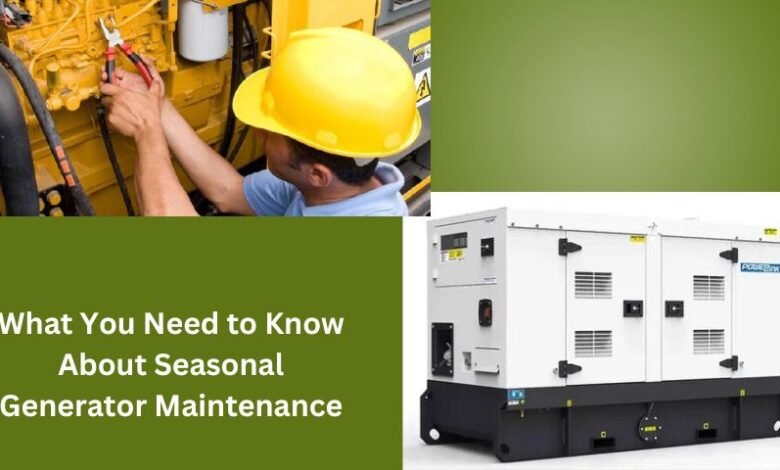
When it comes to ensuring that your generator is ready to perform, regular maintenance is essential. Generators are crucial, especially during power outages, and the last thing you want is for your generator to fail when you need it the most. However, many people overlook the importance of seasonal generator maintenance. This blog will walk you through everything you need to know about keeping your generator in top shape, specifically focusing on seasonal care.
Why Is Seasonal Generator Maintenance Important?
Seasonal generator maintenance is crucial because weather conditions can affect how your generator operates. From extreme heat in the summer to freezing cold in the winter, each season brings challenges. Failing to maintain your generator during these changes can lead to unexpected breakdowns or poor performance.
NOTE: If you’re looking for expert help in keeping your generator in top shape, trust professionals who specialize in Generator Repairs and Maintenance. Reach out today to schedule your seasonal maintenance and ensure your generator is always ready when you need it most!
Key Reasons for Seasonal Maintenance:
- Weather Impact: Different weather conditions affect the functioning of the generator.
- Prevents Damage: Helps in preventing wear and tear that can be caused by seasonal changes.
- Prolongs Lifespan: Regular seasonal care can increase the lifespan of your generator.
Preparing Your Generator for Different Seasons
Each season requires specific maintenance tasks to ensure your generator runs smoothly when you need it most. Here’s a breakdown of what you should do for your generator during different times of the year:

Spring Maintenance
Spring is a great time to check on your generator after it has likely been unused for a few months, especially if you didn’t need it much during the winter. Use this time to give your generator a full inspection and prepare it for the warmer months ahead.
Steps for Spring Generator Maintenance:
- Clean the Generator: Dirt, dust, and debris may have accumulated, so give it a thorough cleaning.
- Test the Battery: The battery may weaken after being unused for a long time. Check the charge and replace if necessary.
- Inspect for Leaks: Make sure there are no oil or fuel leaks.
- Change the Filters: Clean or replace air and oil filters for better performance.
Summer Maintenance
Hot weather can put extra strain on your generator, especially if it’s working hard to power cooling systems during power outages. It’s essential to ensure your generator is ready for the heat.
Steps for Summer Generator Maintenance:
- Check Coolant Levels: Coolant prevents your generator from overheating. Make sure it’s topped off.
- Inspect Hoses and Belts: High temperatures can cause hoses and belts to crack or loosen. Check for any signs of wear.
- Clean Air Intakes: Keep the generator’s air intake vents clear of debris to prevent overheating.
Fall Maintenance
Fall is the perfect time to prepare your generator for the colder months. Regular maintenance now can prevent problems when winter hits.
Steps for Fall Generator Maintenance:
- Check the Fuel System: Ensure the fuel is fresh and the fuel lines are free of any blockages.
- Inspect Spark Plugs: Worn-out spark plugs can cause your generator to malfunction, so replace them if needed.
- Change Oil: Old oil can thicken in cold weather, making it harder for the generator to start. Change the oil to ensure smooth operation.
Winter Maintenance
Winter can be harsh, and your generator might be your only source of power during heavy snow or ice storms. This is why generator repairs and maintenance during winter are critical.
Steps for Winter Generator Maintenance:
- Test Run the Generator: Before winter hits, run the generator for a short period to make sure everything is working.
- Use the Right Oil: Some oils perform better in cold temperatures, so switch to a winter-grade oil if needed.
- Keep the Generator Warm: If your area experiences freezing temperatures, consider using a block heater to keep the generator’s engine warm.
What Are the Common Issues Addressed by Seasonal Maintenance?
Seasonal maintenance helps in addressing several common problems that generators face. Regular checks can save you from costly repairs or complete breakdowns.
Fuel Issues
Generators that sit unused for long periods can develop fuel problems. Old fuel can clog the system, leading to poor performance. Seasonal maintenance ensures that your fuel system stays in good condition, and the fuel is fresh.
Battery Problems
A weak or dead battery is one of the most common reasons for generator failure. Seasonal checks can help you identify battery issues early, allowing you to replace them before they fail when you need the generator most.
Oil and Coolant
Oil and coolant levels drop over time, and if not monitored, this can lead to overheating and severe engine damage. Regular seasonal maintenance includes checking and topping off these fluids to prevent engine failure.
Benefits of Seasonal Generator Maintenance
Maintaining your generator seasonally offers several advantages that can save you time, money, and headaches down the line.
1. Prevents Unexpected Breakdowns
By keeping up with seasonal maintenance, you significantly reduce the risk of an unexpected generator failure, which can be inconvenient and expensive to repair.
2. Increases Efficiency
A well-maintained generator will run more efficiently, saving you on fuel costs and ensuring better overall performance.
3. Extends the Lifespan of Your Generator
Regular maintenance means fewer repairs and less wear and tear. This, in turn, increases the longevity of your generator, giving you more value for your investment.
4. Ensures Safety
Generators that are not maintained properly can pose safety risks, such as overheating or fuel leaks. Seasonal checks can help identify and fix any potential hazards before they become serious.
5. Saves Money
While maintenance requires time and a small investment, it can save you from larger repair costs or even the need to replace your generator prematurely.
DIY Maintenance vs. Professional Help
While some aspects of generator maintenance can be done by yourself, like checking oil levels and replacing air filters, other tasks are better left to the professionals. Hiring an expert for generator repairs and maintenance ensures that everything is done correctly and thoroughly, reducing the risk of missing something important.
When to Call a Professional:
- If you notice any unusual sounds or vibrations while the generator is running.
- If you find any leaks that you’re unsure how to fix.
- If the generator won’t start or struggles to stay on.
Tips for Long-Term Generator Care
In addition to seasonal maintenance, there are several tips you can follow for long-term generator care. These simple habits will ensure that your generator stays in great condition for years to come.
- Run the Generator Regularly: Even if you don’t need it, running your generator for a few minutes each month can keep it in good working order.
- Keep It Clean: Dirt and debris can cause blockages and reduce efficiency. Keep the generator clean, especially after long periods of inactivity.
- Store It Properly: If you are not using your generator for an extended period, make sure it’s stored in a dry and safe location to prevent rust and other damage.
Conclusion
Seasonal generator maintenance is crucial to ensure your generator works efficiently when you need it most. Each season brings unique challenges that can affect your generator’s performance, which is why it’s essential to perform regular maintenance tailored to the time of year. Keeping up with these tasks will not only prolong the life of your generator but also save you money on costly repairs. Whether it’s checking the oil in winter or ensuring your coolant is topped off in summer, the steps are simple yet effective. Don’t wait for a power outage to find out your generator isn’t working. Take care of your generator year-round with regular generator repairs and maintenance.
For more insightful articles related to this topic, feel free to visit toastul.
